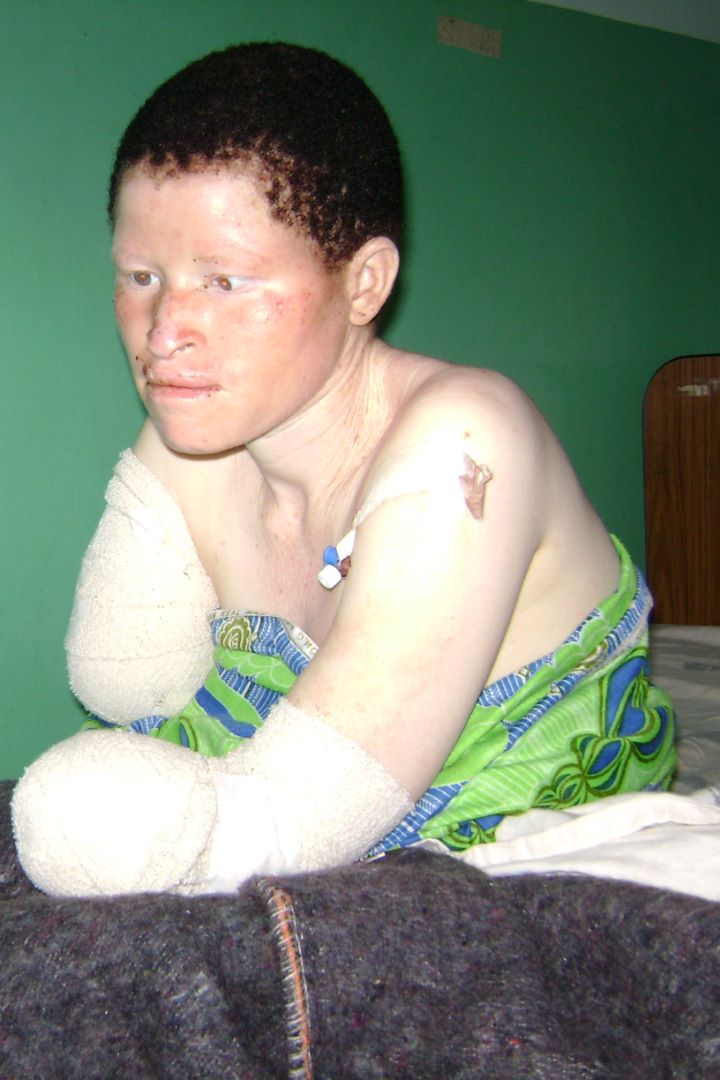Your Shopping Bag is Empty
COMPLIMENTARY TWO-DAY SHIPPING AND RETURNS ON US ORDERS

Hunted for Looking White
4 min read
"One day we were coming home from school. We saw two people who were walking ahead of us. One covered my face and eyes like this and the other one started cutting me. He cut for the first time and he missed. He cut the second time and this time he succeeded. He took my arm and ran away with it." ― Mwigulu [as told to National Geographic]
Now 15, Mwigulu was only 10 years old when he was attacked. Not only did he have to suffer the loss of his arm in such a horrific way, he had to be moved to a safe house near the capital city of Tanzania, Dar-es-Salaam, for his protection, away from the family and friends that he'd known all his life. It would be enough to break most of us but Mwigulu has a level of resilience that is nothing less than admirable and inspiring.
I'd love to say that Mwigulu's story is an isolated case of violence but unfortunately that wouldn't be true. He was butchered because he is a person with albinism, a genetic condition characterized by the absence of melanin in the skin, hair and eyes that also causes issues with vision in most cases.
Since the 1990s, in 29 African countries, at least 209 people with albinism have been killed and 378 attacked, most since 2008. The epicenter of this crime wave, which includes the robbing of graves, is Tanzania where 1 in 1,400 has albinism, one of the most widespread in the world. Compare this to Europe and North America where the rate of people with albinism is only 1 in 20,000.
Why do the attacks happen?
As it is with most cases of violence the world over, ignorance, desperation and cultural shaping tend to be the main drivers. In Africa, particularly sub-Saharan Africa where over 80 percent of the population is black, people with albinism are viewed with suspicion. Thought to be ghosts or haunted beings, the body parts of people with albinism are believed to harness magical powers and are particularly in demand during election years.
According to the Pew Research Center in 2010 who conducted 25,000 face to face interviews in 19 African countries, 60 percent of Tanzanians believe in witchcraft and there are over 75,000 registered witch doctors in the country. For centuries, witchcraft has been used to explain anything inexplicable and without access to education, people are more likely to believe in the claims witch doctors and pass down these beliefs to the next generation.
Media attention of the horrific attacks and the founding of advocacy groups such as Under The Same Sun among others has raised awareness which has resulted in a decline of the number of attacks. From hosting understanding albinism seminars in villages, schools and more, screening the 'White and Black: Crimes of Color' documentary across Tanzania, to distributing 'The Truths About Albinism' leaflets in rural areas, Under The Same Sun has worked to reduce the number of attacks on people with albinism in Tanzania. However, there is still more work to be done.
Since 2007 only 21 people have been convicted for murdering people with albinism in just six cases, according to Tanzanian prosecutor Beatrice Mpembo, who blames the low number on lack of cooperation from relatives. Peter Ash, CEO of Under The Same Sun, says only about 5 percent of those arrested are convicted. No one has ever named any of the primary instigators of this violence—the affluent clients of the witch doctors.
According to a 2009 report by the International Federation of Red Cross and Red Crescent Societies, a complete set of body parts from a person with albinism, including "all four limbs, genitals, ears, tongue and nose," can bring in up to $75,000 on the black market. This is a staggering sum only the very rich can afford in a country where the median wage is approximately $525 per month.
Why did I get interested in this cause?
Growing up in the capital city of Kenya, Nairobi, I didn't know anyone with albinism and I only recall seeing persons with albinism on rare occasions. It was only in 2015 when I was reading the news online from the comfort of my home in Minneapolis that I came across an article in the Daily Mail, reporting on one of the recent attacks in Tanzania.
I couldn't believe what I was reading. How could this be happening in my beloved Africa? I don't even know why I was surprised.
After living in the US for almost two decades and traveling all over the world, I'd come to accept the unfortunate reality that ignorance is undiscriminating and knows no borders.
"Everybody is ignorant, only on different subjects" ― Will Rogers
“There is nothing more frightful than ignorance in action.” ― Johann Wolfgang von Goethe
Ever since then, I've been a financial supporter of Under The Same Sun but I've always yearned to do more. It is unconscionable that anyone, especially defenseless children, should be denied their human right to life, liberty and security of their person.
That's why this summer, I will be rolling up my sleeves by volunteering for their summer camp in Tanzania. The camp will give volunteers the opportunity to engage with the children with albinism in the Under The Same Sun Education Program. Many of these children bear deep scars from the traumatic experience of losing a limb or more, not to mention being ostracized by their communities and having to live away from their families in safe houses for their own protection. My hope is that by getting involved, I can help bring more awareness to this worthy cause.
"The only thing necessary for the triumph of evil is for good men to do nothing"―Edmund Burke
How can you help?
Contribute directly to Under The Same Sun [one-time donation or monthly gift to support a child’s education]
Give back by giving to yourself and others [10% of proceeds from Dalasini's Heritage Collection go to Under The Same Sun]
Sources: National Geographic, Pew Research Center, Under The Same Sun, United Nations
Photo: Under The Same Sun

